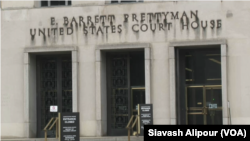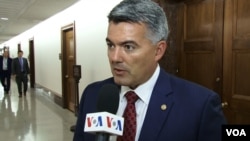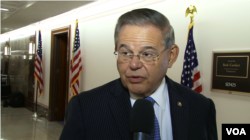A U.S. judge has denied bond to an Iranian-born U.S. resident accused of involvement in a conspiracy to spy for Tehran on Iranian opposition activists and Israeli and Jewish groups in the United States.
At Tuesday’s hearing at the U.S. District Court for the District of Columbia, Magistrate Judge Michael Harvey denied a defense lawyer’s request to release Majid Ghorbani on bond, ruling that the suspect posed a flight risk. Harvey ordered Ghorbani to remain in detention until a Sept. 6 hearing in Washington before U.S. District Judge Paul Friedman.
U.S. prosecutors announced charges against Ghorbani, a 59-year-old California-based Iranian, and a second man, Iranian-American dual national Ahmadreza Mohammadi Doostdar, 38, late Monday.
The two men were charged with knowingly acting as agents of Iran without prior notification to the U.S. Attorney General, providing services to Iran in violation of U.S. sanctions, and conspiracy. The prosecutors said Ghorbani and Doostdar were arrested in the Los Angeles area and Chicago, respectively, on August 9.
In a criminal complaint released on Tuesday, an FBI agent who worked on the case accused Doostdar and Ghorbani of operating as agents of Iran in the U.S. since July 2017. He said their goal was to provide the Iranian government with information about the U.S.-based activities of Israeli and Jewish groups and supporters of the MEK, an exiled Iranian opposition group that seeks to overthrow Iran’s Islamist leadership.
The FBI agent said the intelligence was meant to enable Tehran to target those organizations in the U.S.
U.S. Republican Senator Cory Gardner, speaking to VOA Persian on Tuesday, said the reports of Iranian spying in the U.S. were “very disturbing” if true.
“Iran’s malign activities in the U.S. and around the globe are unacceptable, and that is why I think the [Trump administration’s] sanctions and pressure increase on Iran is appropriate and important,” Gardner said.
In separate remarks to VOA Persian, Democratic Senator Bob Menendez said the suspected spying case reinforces his call for the Trump administration to “vigorously enforce” the Iran-related provisions of the Countering America's Adversaries Through Sanctions Act (CAATSA). Signed by President Donald Trump in August 2017, it calls for sanctions to be imposed on Iran’s military. “There are still sections (of CAATSA) that have not been pursued. I think they should be,” Menendez said.
At Tuesday’s hearing, Ghorbani’s lawyer entered a plea of not guilty to the charges. Ghorbani appeared calm and did not speak as he listened to an English translation of the proceedings through an audio device. His daughter and son-in-law were present in the courtroom.
Prosecutors said Ghorbani, who has lived in Costa Mesa, California, since moving to the U.S. in 1995, has worked in a local Persian restaurant for the past 20 years – a restaurant they said has been frequented by MEK supporters. Ghorbani obtained a green card in 2015, making him a permanent U.S. resident.
Rene Redjaian, a public relations director for the Darya restaurant in California’s Orange County, confirmed to VOA Persian on Wednesday that Ghorbani had worked there as a server, on and off, for two decades. In an online video statement, Redjaian expressed shock at Ghorbani’s arrest and said Darya’s owners and management had no knowledge of his involvement in the alleged spying plot. “Our owners and employees love America and have no affiliation to extremists of Iran,” she said. Redjaian also told VOA Persian that none of the restaurant’s staff felt Ghorbani had been acting suspiciously.
The criminal complaint said Doostdar, who was living in Tehran, met Ghorbani at the back of the restaurant in July 2017 in their first of several Los Angeles-area encounters over the following months. It said court-authorized electronic surveillance of one such meeting in December 2017 showed them discussing an MEK rally that Ghorbani had attended and photographed in New York in September 2017 and how Ghorbani would transfer the images to Doostdar.
The complaint accused Ghorbani of conducting similar surveillance in May 2018 at Washington’s Grand Hyatt hotel, where the MEK-allied Organization of Iranian American Communities (OIAC) was hosting an Iran Freedom Convention for Human Rights. It said an OIAC YouTube video of one of the speakers, former New York Mayor Rudy Giuliani, showed Ghorbani in the audience, holding up a mobile phone to film the event.
Prior to the OIAC event, the complaint said Ghorbani visited Iran from March to April 2018. It said he had told Doostdar in a December 2017 meeting that he would travel to Iran in March 2018 for an “in-person briefing.” There was no word in the complaint or at Tuesday’s hearing about any contact Ghorbani or Doostdar may have had with Iranian officials.
In a Tuesday interview with VOA Persian, Washington-based analyst Richard Goldberg of the Foundation for Defense of Democracies said that if true, the allegations represent what he calls a “stunning” plot by Iran within U.S. territory while President Trump remained a party to the 2015 nuclear deal between Tehran, his predecessor and five other world powers. Trump withdrew from the agreement on May 8, saying he wanted a new deal to permanently prevent Iran from developing nuclear weapons – a goal Tehran denies having.
“This [spying] activity was not an Iranian response to Trump pulling out of the deal, not even a response to him decertifying the deal as he did last October,” Goldberg said. “This happened when the administration was, very early on, reviewing its policy and giving the nuclear deal a chance.”
Goldberg also said there were no previous signs of Iranian agents plotting to attack Americans within the U.S. “In this case, it seems the Iranians were targeting American Jewish institutions, not looking at foreigners as they did in the 2011 case of the Saudi ambassador. This is an escalation,” he said. In 2011, U.S. authorities charged two Iranians with plotting to assassinate the Saudi envoy to the U.S. on behalf of the Iranian government. Iran called the charges fabricated.
There was no immediate comment on social media from Iran’s Supreme Leader Ayatollah Ali Khamenei or Foreign Minister Mohammad Javad Zarif to the new U.S. allegations of an Iranian plot on U.S. soil.
Shahla Arasteh and Guita Aryan of VOA’s Persian Service contributed to this report.






